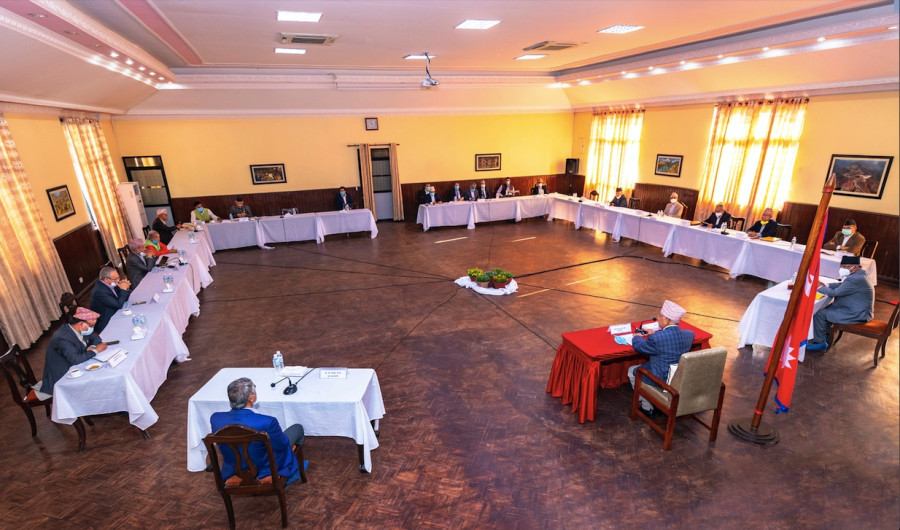National
Cross-party leaders urge Oli government to hold talks with both India and China on Lipulekh
At an all-party meeting called to discuss India’s opening of a road via Lipulekh, political leaders criticised the government’s response and asked that immediate steps be taken.
Anil Giri
Former prime ministers and leaders of political parties represented in the federal parliament have urged the KP Sharma Oli government to hold talks with both India and China in order to settle the Lipulekh issue.
Speaking at an all-party meeting called by Prime Minister Oli at Baluwatar on Wednesday, a majority of political leaders said that since the road link opened by India via Lipulekh will ultimately reach the Tibetan Autonomous Region of China, Nepal should hold talks with Beijing as well, according to statements released by leaders after the meeting.
India’s announcement on Friday that it had inaugurated a road link via Lipulekh, which Nepal claims as its own territory, identifying it as the “China border” has sparked protests in Nepal. India has described the road link from Dharchula to Lipulekh as what is famously known as the Kailash-Mansarovar Yatra Route.
The opening of the road has put the Oli government under immense pressure from the public as well as leaders from across the political spectrum to take immediate steps to settle the boundary row.
According to a participant at Wednesday's meeting, most leaders called on the government to initiate political and diplomatic talks with both India and China while also criticising the government for not taking any concrete steps in the last six months to hold talks with India over the Kalapani issue.
New Delhi’s Friday move comes six months after it placed Kalapani within Indian borders on a new political map published on November 2 in line with the Narendra Modi government’s decision to split up Jammu and Kashmir into two federal territories.
After a huge uproar, Oli, on November 10, had called a similar all-party meeting to solicit views on resolving the boundary dispute with India. Leaders present at the meeting had thrown their weight behind Oli and called on the prime minister to initiate diplomatic talks with India.
The government had sought a date to hold talks but India never responded, largely due to the Oli government’s failure to properly follow up on the issue, say critics.
Since India’s announcement of opening the road link, government officials have made several conflicting statements, earning even more criticism for the Oli government.
Foreign Minister Pradeep Gyawali, who on Friday evening told the Rastriya Samachar Samiti that the government only learned about India opening a road link via Lipulekh through media reports, told Parliament on Sunday that the government knew all along, since 2012, that India was constructing the road.
Prime Minister Oli, however, said on Tuesday that he had no idea about India constructing the road and that he had not been apprised by anyone of what India was doing in Nepali territory.
“I came to know about it via media reports,” Oli told a meeting of the Council of Ministers on Tuesday.
After Wednesday’s all-party meeting, Nepali Congress President and former prime minister Sher Bahadur Deuba said that his party had asked the government to hold trilateral talks among Nepal, India and China in order to end the dispute at the Lipulekh pass.
“When India and China agreed to expand a trade route via Lipulekh in 2015, then government led by Sushil Koirala had lodged protests with both Delhi and Beijing by sending diplomatic notes,” Deuba reportedly said at the meeting, reading out his party’s official position, a copy of which was seen by the Post. “So the Nepal government should immediately hold talks with both India and China and make our position clear that Lipulekh, Kalapani and Limpiyadhura belong to Nepal. Any encroachment is not acceptable.”
Baburam Bhattarai, also a former prime minister and Janata Samajbadi Party leader, said that Nepal has several options to resolve the dispute with India but before pursuing any of these, the parties needed to build a common position, rather than playing the nationalist card.
“First, I have urged the government to gather enough evidence so that we have a strong case,” said Bhattarai. “Second we have to reactivate the boundary mechanism with India.”
Bhattarai too stressed talks at diplomatic and political levels.
“We have yet another alternative, which is internationalising the issue,” he said.” But not at this moment, because it requires a lot of preparations. We have to focus on talks with both India and China.”
Since the road was opened on Friday, Nepali and Indian officials have traded statements.
On Saturday evening, after Nepal Foreign Ministry issued an official statement on the road link, India’s Ministry of External Affairs, in a press statement of its own, responded saying that India had built the road within its own territory and that Delhi was working to hold talks with Nepal after the Covid-19 crisis.
Subsequently, the Foreign Ministry, on Monday, summoned Indian Ambassador Vinay Mohan Kwatra and handed over a diplomatic note, making Nepal’s position clear on boundary issues.
On Monday, the Indian Embassy in Nepal refused to acknowledge that it had received a diplomatic note and instead, said that Kwatra submitted a copy of the statement by the Indian External Affairs Ministry to Foreign Minister Gyawali.
The Lipulekh issue has now put the Oli government in a bind. Given the region’s positioning and an agreement between India and China in 2015, many say it is incumbent on Kathmandu to also hold talks with Beijing. But since 2015, Nepal has not engaged with the Chinese in any capacity regarding Lipulekh.
At Wednesday’s meeting, Oli said that the issue is not related to one political party or a particular government.
“It’s about nationality and territorial integrity,” said Oli, according to Foreign Minister Gyawali, we have to establish our claim.




 21.12°C Kathmandu
21.12°C Kathmandu














